Ludwig Emil Grimm
Ludwig Emil Grimm (14 March 1790 – 4 April 1863) was a German painter, art professor, etcher and copper engraver. His brothers were the well-known folklorists, Jacob and Wilhelm Grimm.
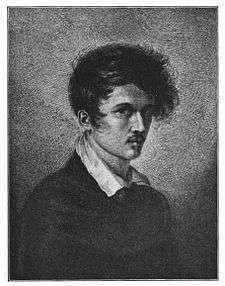
Life and work
He was born in Hanau and developed an interest in nature early in life. His studies began at the Kunsthochschule Kassel and he took lessons from Philip Otto Runge.[1] From 1809 to 1817, he studied at the newly founded Academy of Fine Arts Munich, interrupted only by a brief stint as an officer in the 1814 campaign against Napoleon[1] and a study trip to Italy in 1816. While there, he learned engraving from Carl Ernst Christoph Hess.[2] Upon completion of his studies, he published his first work; a sketchbook of engravings based on his Italian journey. He also contributed the frontispiece for the second edition of Kinder- und Hausmärchen (Grimm's Fairy Tales) in 1819.
Thanks to his brothers' connections to the academic community in Göttingen, he was able to secure commissions for two series of portraits of scholars, professors and doctors; the first in 1823 and the second in 1826. In between, he helped Gerhardt Wilhelm von Reutern found the artists' colony in Willingshausen. He became a Professor of history painting at the Kassel Academy in 1832.[2]
Two years after his first wife's death in 1842, he married the daughter of Reform theologian Christoph Friedrich Wilhelm Ernst. In 1860, health problems made it increasingly difficult to draw. He died of pneumonia in 1863 in Kassel.
Since 2012, the city of Hanau has awarded the "Ludwig Emil Grimm Prize" to young artists. In March 2014, a life-size bronze statue of him was dedicated there in front of the "Zum Riesen" hotel as a gift to the city from the hotel's owners. It was designed by the painter Joerg Eyfferth.
Writings
- Erinnerungen aus meinem Leben (Memoirs of My Life), edited with commentary by Adolf Stoll. Hesse & Becker, Leipzig 1911 (Digitalized).
Selected works
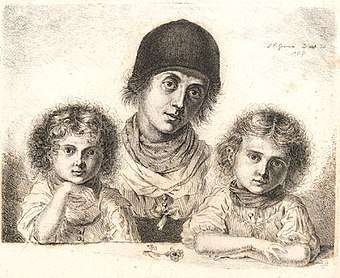 Farmer's wife from Egern with her daughters (1813)
Farmer's wife from Egern with her daughters (1813)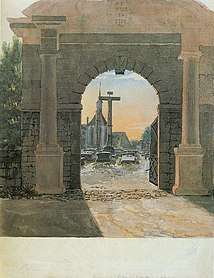 The Johannisfriedhof in Nuremberg (1828)
The Johannisfriedhof in Nuremberg (1828)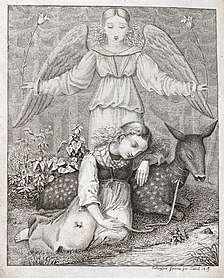 Frontispiece to Grimm's Fairy Tales (1819)
Frontispiece to Grimm's Fairy Tales (1819)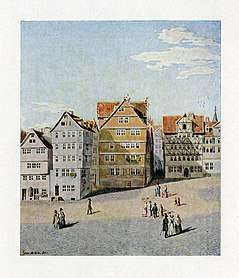 Marstaellerplatz in Kassel (1844)
Marstaellerplatz in Kassel (1844)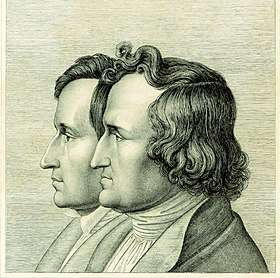 Double portrait of Jacob and Wilhelm (1843)
Double portrait of Jacob and Wilhelm (1843)
References
- Heinz H. Biehn (1966), "Grimm, Ludwig Emil", Neue Deutsche Biographie (NDB) (in German), 7, Berlin: Duncker & Humblot, pp. 81–82; (full text online)
- ADB:Grimm, Ludwig Emil (1879), "Grimm, Ludwig Emil", Allgemeine Deutsche Biographie (ADB) (in German), 9, Leipzig: Duncker & Humblot, pp. 689–690
Further reading
- Herbert von Bose: Das Bild des Fremden im Werk von Ludwig Emil Grimm (1790-1863) (Images of the Strange in the Work of...) Tectum Verlag, Marburg 2007, ISBN 978-3-8288-9451-8
External links
| Wikimedia Commons has media related to Ludwig Emil Grimm. |
- Literature by and about Ludwig Emil Grimm in the German National Library catalogue
- There is literature about Ludwig Emil Grimm in the Hessian Bibliography
- Brüder Grimm-Museum Kassel and Brüder Grimm-Gesellschaft
- Malerkolonie Willingshausen